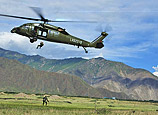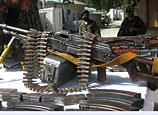
BEIJING, July 1 (Xinhua) -- The South China Sea saw more turbulence on Sunday as the Philippines issued surprisingly strong-worded accusations against China on the sidelines of a foreign ministers' meeting of the Association of the Southeast Asian Nations (ASEAN).
Philippine Foreign Affairs Secretary Albert Del Rosario, whose country has repeatedly provoked China on territorial issues and sought to introduce outside meddling in regional affairs, again blamed China for so-called "massive military buildup" in the South China Sea.
For a country that has been zealous about taking in retired warships from other countries to build up its military power and that has from time to time conducted war games in the South China Sea, the top Philippine diplomat's claims carried a particularly strong sense of irony and absurdity.
The Philippines, under its current administration, has been a true trouble-maker in the region.
It wrongly assaulted and detained Chinese fishermen in Chinese territorial waters. One of its retired warships was stranded on purpose around China's Ren'ai Reef in a disguised move to illegally seize the Chinese territory.
The country has in the past taken China's self restraint as a sign of weakness. It now finds itself in an increasingly difficult situation when a determined China fights back.
The Philippine government has followed a two-track strategy to seek a way out. Firstly, it has sought support from outside countries, particularly the United States and Japan, to counter China's influence.
Secondly, it has tried in vain to tie its dispute with China to the agenda of numerous ASEAN meetings, aiming to sabotage wider China-ASEAN relations.
So far the strategy has got nowhere. Outside meddling in regional affairs has only complicated the matter.
Other countries, especially the United States, which has been talking about a new type of major-country relationship with China, are not showing Manila blanket support.
The Philippine government will only find itself more isolated if it continues to escalate its dispute with China.
For other ASEAN countries, they are also tired of seeing Manila poison the atmosphere of one regional meeting after another with provocative accusations again China, with which the bloc has enjoyed rather fruitful relations.
China always wishes to turn South China Sea into a water of peace, friendship and cooperation and tries its best to shelve differences and pursue joint development.
Most of the ASEAN members have also sent out a clear signal that they will not meddle in the bilateral disputes and value stable fruitful ties with China.
After too much theatrics from Manila, it is time for the ASEAN and China to move forward. After all, compared with the bloc's ambitious plan of regional integration and cooperation, the territorial disputes are at the most a minor distraction.
















 Taiwan's average temperature in June reaches record high
Taiwan's average temperature in June reaches record high


![]()
